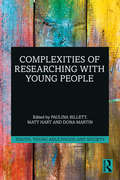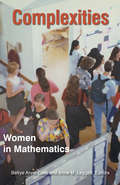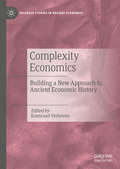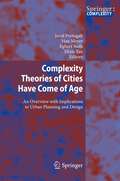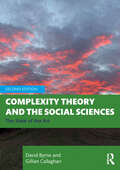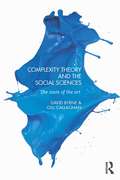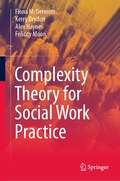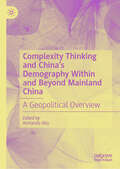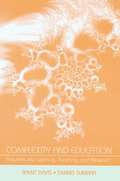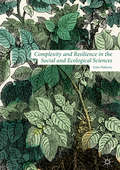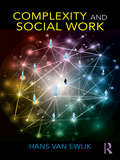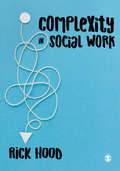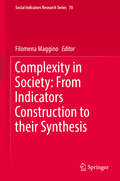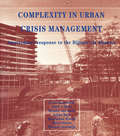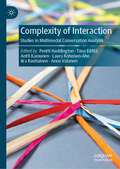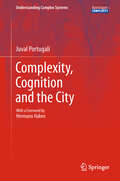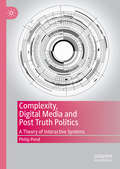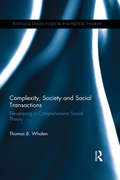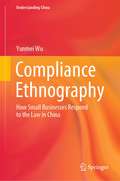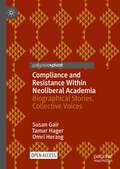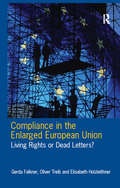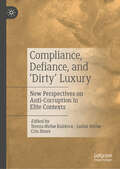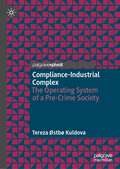- Table View
- List View
Complexities of Researching with Young People (Youth, Young Adulthood and Society)
by Paulina Billett Matt Hart Dona MartinCurrently, most books on youth research available on the market focus on ‘how to’ conduct youth research or the research process itself. This edited collection proposes to take this process a step further and discuss the complexities of youth research from a practical and theoretical context.In total, five themes are examined – conceptualising young people, ethics and consent, the digital, voice, participation and unexpected tensions. In this book, authors from six countries explore the complexities of researching with young people across disciplines and national contexts.Offering a closeup examination of their own research experiences, the authors address the complexities of researching with young people beyond simple questions of protection from harm and coercion by problematising notions of ‘resilience’, ‘participation’, ‘risk’ and ‘voice’. This edited collection takes the reader through an exploration of its key themes and, in doing so, presents a cast of candid and insightful accounts from youth researchers situated within the humanities and social sciences.
Complexities: Women in Mathematics
by Anne M. Leggett Bettye Anne CaseSophie Germain taught herself mathematics by candlelight, huddled in her bedclothes. Ada Byron Lovelace anticipated aspects of general-purpose digital computing by more than a century. Cora Ratto de Sadosky advanced messages of tolerance and equality while sharing her mathematical talents with generations of students. This captivating book gives voice to women mathematicians from the late eighteenth century through to the present day. It documents the complex nature of the conditions women around the world have faced--and continue to face--while pursuing their careers in mathematics. The stories of the three women above and those of many more appear here, each one enlightening and inspiring. The earlier parts of the book provide historical context and perspective, beginning with excursions into the lives of fifteen women born before 1920. Included are histories of collective efforts to improve women's opportunities in research mathematics. In addition, a photo essay puts a human face on the subject as it illustrates women's contributions in professional associations. More than eighty women from academe, government, and the private sector provide a rich mélange of insights and strategies for creating workable career paths while maintaining rewarding personal lives. The book discusses related social and cultural issues, and includes a summary of recent comparative data relating to women and men in mathematics and women from other sciences. First-person accounts provide explicit how-tos; many narratives demonstrate great determination and perseverance. Talented women vividly portray their pleasure in discovering new mathematics. The senior among them speak out candidly, interweaving their mathematics with autobiographical detail. At the beginning of a new century, women at all stages of their careers share their outlooks and experiences. Clear, engaging, and meticulously researched, Complexities will inspire young women who are contemplating careers in mathematics and will speak to women in many fields of endeavor and walks of life.
Complexity Economics: Building a New Approach to Ancient Economic History (Palgrave Studies in Ancient Economies)
by Koenraad VerbovenEconomic archaeology and ancient economic history have boomed the past decades. The former thanks to greatly enhanced techniques to identify, collect, and interpret material remains as proxies for economic interactions and performance; the latter by embracing the frameworks of new institutional economics. Both disciplines, however, still have great difficulty talking with each other. There is no reliable method to convert ancient proxy-data into the economic indicators used in economic history. In turn, the shared cultural belief-systems underlying institutions and the symbolic ways in which these are reproduced remain invisible in the material record. This book explores ways to bring both disciplines closer together by building a theoretical and methodological framework to evaluate and integrate archaeological proxy-data in economic history research. Rather than the linear interpretations offered by neoclassical or neomalthusian models, we argue that complexity economics, based on system theory, offers a promising way forward.
Complexity Theories of Cities Have Come of Age: An Overview with Implications to Urban Planning and Design
by Juval Portugali Egbert Stolk Ekim Tan Han MeyerToday, our cities are an embodiment of the complex, historical evolution of knowledge, desires and technology. Our planned and designed activities co-evolve with our aspirations, mediated by the existing technologies and social structures. The city represents the accretion and accumulation of successive layers of collective activity, structuring and being structured by other, increasingly distant cities, reaching now right around the globe. This historical and structural development cannot therefore be understood or captured by any set of fixed quantitative relations. Structural changes imply that the patterns of growth, and their underlying reasons change over time, and therefore that any attempt to control the morphology of cities and their patterns of flow by means of planning and design, must be dynamical, based on the mechanisms that drive the changes occurring at a given moment. This carefully edited post-proceedings volume gathers a snapshot view by leading researchers in field, of current complexity theories of cities. In it, the achievements, criticisms and potentials yet to be realized are reviewed and the implications to planning and urban design are assessed.
Complexity Theory and the Social Sciences: The State of the Art
by David Byrne Gillian CallaghanThis expanded and updated edition of Complexity Theory and the Social Sciences: The State of the Art revisits the use of complexity theory across the social sciences and demonstrates how complexity informs approaches to various contemporary issues in the context of the COVID-19 pandemic, widening social inequality, and impending social and ecological catastrophe wrought by global warming. The book reviews complexity theory in the practice of the social sciences and at their interface with ecological science. It outlines how social theory can be reconciled with complexity thinking and presents a review of the way research can be done using complexity theory. The book suggests how complexity theory can be used to understand and evaluate governance processes, particularly with regard to social inequality and the climate crisis. The impact of the COVID-19 pandemic is also examined through a complexity lens, reviewing how complexity thinking has been employed in relation to the pandemic and how implementing a complexity framework can transform health and social care. The book concludes with a call to action and the use of complexity theory to inform critical thinking in the education system. This textbook will be immensely useful to students and researchers interested in social research methods, social theory, business and organization studies, health, education, urban studies, and development studies.
Complexity Theory and the Social Sciences: The state of the art
by David Byrne Gillian CallaghanFor the past two decades, ‘complexity’ has informed a range of work across the social sciences. There are diverse schools of complexity thinking, and authors have used these ideas in a multiplicity of ways, from health inequalities to the organization of large scale firms. Some understand complexity as emergence from the rule-based interactions of simple agents and explore it through agent-based modelling. Others argue against such ‘restricted complexity’ and for the development of case-based narratives deploying a much wider set of approaches and techniques. Major social theorists have been reinterpreted through a complexity lens and the whole methodological programme of the social sciences has been recast in complexity terms. In four parts, this book seeks to establish ‘the state of the art’ of complexity-informed social science as it stands now, examining: the key issues in complexity theory the implications of complexity theory for social theory the methodology and methods of complexity theory complexity within disciplines and fields. It also points ways forward towards a complexity-informed social science for the twenty-first century, investigating the argument for a post-disciplinary, ‘open’ social science. Byrne and Callaghan consider how this might be developed as a programme of teaching and research within social science. This book will be particularly relevant for, and interesting to, students and scholars of social research methods, social theory, business and organization studies, health, education, urban studies and development studies.
Complexity Theory for Social Work Practice
by Fiona McDermott Kerry Brydon Alex Haynes Felicity MoonThis textbook provides a grounding in complexity theory, demonstrating how it can influence and shape social work interventions in policy, management, and practice, as well as forming an epistemological and methodological basis for research. It provides a contemporary theoretical basis for social work practice, equipping social workers to work in a 21st-Century world. The authors argue that the history of social work demonstrates the profession's engagement with the social and structural problems of each era since its emergence 150 years ago. However, in the 21st Century, such things as globalisation, the COVID-19 pandemic, and climate change have highlighted that existing theories and practice models are insufficient to the task of working with the complicatedness of contemporary life in a fast-changing world. Distilling the central tenets of Complexity Theory and the notion of complex adaptive systems in partnership with pragmatism, the book provides practice perspectives and guidelines which build on social work's enduring commitment to understanding the person-in-context. The recognition that social workers require conceptual and theoretical agility to work across micro, meso and macro 'levels' remains central, but the argument is made that their focus and practice must primarily be at the meso level. The authorship of combined academic and practice expertise enables such perspectives to be brought to life through the theoretical and practical analysis of conceptual and 'real-world' challenges. The book consists of 13 chapters organized in three sections:Part I: Complex Practice in a Complex WorldPart II: Thinking Complexity in PracticePart III: Thinking Complexity in Public Policy, Research and EducationComplexity Theory for Social Work Practice encourages social workers to 'think complexity' and 'act pragmatically'. It is intended for final-year social work students; academics and researchers working in a range of disciplines, primarily in the social work field but also in the areas of sociology, psychology and anthropology; and practitioners in policy, research, management and practice settings.
Complexity Thinking and China’s Demography Within and Beyond Mainland China: A Geopolitical Overview
by Armando AliuThis book uses complexity thinking to explore China’s demography and population-driven geopolitics within and beyond mainland China. From a multidisciplinary perspective, the book is relevant to the debates of Chinese demography studies and politics of contemporary China. It combines international relations approaches, demography research, and legal studies to conceive the recent demographic trends and social transformations in China and across the world. The book prioritizes the anthropological viewpoint to provide a better understanding of demographic phenomena and combine an anthropological demography perspective with complexity thinking and geopolitics. This book will interest scholars of China, of geopolitics, and demographers.
Complexity and Education: Inquiries Into Learning, Teaching, and Research
by Brent Davis Dennis SumaraThis book explores the contributions, actual and potential, of complexity thinking to educational research and practice. While its focus is on the theoretical premises and the methodology, not specific applications, the aim is pragmatic--to present complexity thinking as an important and appropriate attitude for educators and educational researchers. Part I is concerned with global issues around complexity thinking, as read through an educational lens. Part II cites a diversity of practices and studies that are either explicitly informed by or that might be aligned with complexity research, and offers focused and practiced advice for structuring projects in ways that are consistent with complexity thinking. Complexity thinking offers a powerful alternative to the linear, reductionist approaches to inquiry that have dominated the sciences for hundreds of years and educational research for more than a century. It has captured the attention of many researchers whose studies reach across traditional disciplinary boundaries to investigate phenomena such as: How does the brain work? What is consciousness? What is intelligence? What is the role of emergent technologies in shaping personalities and possibilities? How do social collectives work? What is knowledge? Complexity research posits that a deep similarity among these phenomena is that each points toward some sort of system that learns. The authors’ intent is not to offer a complete account of the relevance of complexity thinking to education, not to prescribe and delimit, but to challenge readers to examine their own assumptions and theoretical commitments--whether anchored by commonsense, classical thought or any of the posts (such as postmodernism, poststructuralism, postcolonialism, postpositivism, postformalism, postepistemology) that mark the edges of current discursive possibility. Complexity and Education is THE introduction to the emerging field of complexity thinking for the education community. It is specifically relevant for educational researchers, graduate students, and inquiry-oriented teacher practitioners.
Complexity and Resilience in the Social and Ecological Sciences
by Eoin FlahertyThis book introduces a new approach to environmental sociology, by integrating complexity-informed social science, Marxian ecological theory, and resilience-based human ecology. It argues that sociologists have largely ignored developments in ecology which move beyond functionalist approaches to systems analysis, and as a result, environmental sociology has failed to capitalise not only on the analytical promise of resilience ecology, but on complementary developments in complexity theory. By tracing the origins and discussing current developments in each of these areas, it offers several paths to interdisciplinary dialogue. Eoin Flaherty argues that complexity theory and Marxian ecology can enhance our understanding of the social aspect of social-ecological systems, whilst a resilience approach can sharpen the analytical power of environmental sociology.
Complexity and Social Work
by Hans Van EwijkBeing socially competent is essential in late modern society. We expect people to find their own accommodation, partner, job, community and lifestyle and struggle to find answers for those who are not able or do not have the opportunity to achieve these things. By placing social complexity, social vulnerability and social efficacy within a framework of social policy and social practice, Complexity and Social Work argues that growing social complexity excludes more and more citizens from social participation. The book starts with exploring complexity, super-diversity, vulnerability and social efficacy. From there the book deals with the discourses of social policy, social work and social work research, pledging for social policy aiming at desired outcomes, for generic contextual social work, and for a research practice that recognises practical wisdom. Aimed at final year undergraduates, postgraduates, professionals, trainers and lecturers involved in social work, social policy, social care, mental health and allied fields who are committed to treating socially vulnerable people with respect and acceptance, this book, the first of its kind, offers new perspectives on social complexity for practice, theory and research in human services.
Complexity in Social Work
by Rick HoodComplexity lies at the heart of social work practice and this book is designed to help students and newly-qualified social workers plan for and manage complex cases in an increasingly complex environment. Split into two parts, this book reflects the journey of qualifying social work students from preparation for practice in an educational context to learning ‘on the job’ through working with service users in practice settings, and eventually assuming a more senior role in management, administration and training. Key topics covered in the chapters include managing volatility and uncertainty, making judgements and decisions, building and maintaining relationships, using reflection and supervision, working interprofessionally, managing risk, exploring cause and effect.
Complexity in Social Work
by Rick HoodComplexity lies at the heart of social work practice and this book is designed to help students and newly-qualified social workers plan for and manage complex cases in an increasingly complex environment. Split into two parts, this book reflects the journey of qualifying social work students from preparation for practice in an educational context to learning ‘on the job’ through working with service users in practice settings, and eventually assuming a more senior role in management, administration and training. Key topics covered in the chapters include managing volatility and uncertainty, making judgements and decisions, building and maintaining relationships, using reflection and supervision, working interprofessionally, managing risk, exploring cause and effect.
Complexity in Society: From Indicators Construction to their Synthesis (Social Indicators Research Series #70)
by Filomena MagginoThis volume discusses the many recent significant developments, and identifies important problems, in the field of social indicators. In the last ten years the methodology of multivariate analysis and synthetic indicators construction significantly developed. In particular, starting from the classical theory of composite indicators many interesting approaches have been developed to overcome the weaknesses of composites. This volume focuses on these recent developments in synthesizing indicators, and more generally, in quantifying complex phenomena.
Complexity in Urban Crisis Management: Amsterdam's Response to the Bijlmer Air Disaster
by et al U. RosenthalFirst Published in 1994. Routledge is an imprint of Taylor & Francis, an informa company.
Complexity of Interaction: Studies in Multimodal Conversation Analysis
by Pentti Haddington Tiina Eilittä Antti Kamunen Laura Kohonen-Aho Iira Rautiainen Anna VatanenEveryday social life is deeply tied to the ways in which people talk, interact, and engage in joint activities with each other. This book examines language use and social interaction through the lens of complexity, focusing on how participants establish and maintain shared understanding in multi-layered situations and settings. This book will find readership among students and scholars who use video-based methods and are interested in interaction, intersubjectivity and multimodality.
Complexity, Cognition and the City: Simulation, Cognition And Vr In The Study And Planning Of Cities (Understanding Complex Systems)
by Juval PortugaliComplexity, Cognition and the City aims at a deeper understanding of urbanism, while invoking, on an equal footing, the contributions both the hard and soft sciences have made, and are still making, when grappling with the many issues and facets of regional planning and dynamics. In this work, the author goes beyond merely seeing the city as a self-organized, emerging pattern of some collective interaction between many stylized urban "agents" - he makes the crucial step of attributing cognition to his agents and thus raises, for the first time, the question on how to deal with a complex system composed of many interacting complex agents in clearly defined settings. Accordingly, the author eventually addresses issues of practical relevance for urban planners and decision makers. The book unfolds its message in a largely nontechnical manner, so as to provide a broad interdisciplinary readership with insights, ideas, and other stimuli to encourage further research - with the twofold aim of further pushing back the boundaries of complexity science and emphasizing the all-important interrelation of hard and soft sciences in recognizing the cognitive sciences as another necessary ingredient for meaningful urban studies.
Complexity, Digital Media and Post Truth Politics: A Theory of Interactive Systems
by Philip PondThis book analyses the relationship between digital media systems and post truth politics. It demonstrates that the complexity of modern systems is an existential challenge for our ability to understand and research these issues. A new theory is proposed for studying complexity, explaining how system interactionism differs from established ideas, including assemblage and actor network theories. After considering the social system of Niklas Luhmann, the author proposes an interactionist methodology better equipped to deal with system complexity. A description of the logical operations of the digital and political systems is provided, establishing precedents for an analysis of the role of hypertext in shaping the emergent digital-politics. The book demonstrates how the principles of system interactionism can guide digital media research into polarisation and political language.
Complexity, Society and Social Transactions: Developing a Comprehensive Social Theory (Routledge Studies in Social and Political Thought)
by Thomas B. WhalenThis book develops and presents a general social theory explaining social, cultural and economic ontology and, as a by-product, the ontology of other social institutions and structures. This theory is called social transaction theory. Using the framework of the complex adaptive systems model, this transdisciplinary social theory proposes that society, culture and economy are emergent from social and environmental transaction and negotiation. Each transaction contains an element of negotiation. With each transaction, there is continual renegotiation, however small or large. Even if the result is no change, renegotiation takes place. Thus, there is a constant emergence of social constructions and a continuous reconstruction of society in the ‘specious present.’ Practices, beliefs, explanations, and traditions become part of the accepted canon of a group through continual social transaction. Deviations from canon and expected outcomes are managed through narrative. Narrative can be either rejected or accepted into the social canon of a group or society. This social theory applied Bhaskar’s critical realism to refine the several theoretical works that were utilized. These include complex adaptive systems, Mead’s social theory, Maslow’s hierarchy of needs, Strauss’s negotiated order theory, game theory, Bruner’s narrative and folk psychology, Giddens's structuration theory and Ricoeur’s interpretation theory. A transdisciplinary account of the emergence of society and culture and the role of narrative, Complexity, Society and Social Transactions will appeal to scholars and practitioners of social theory and sociology.
Compliance Ethnography: How Small Businesses Respond to the Law in China (Understanding China)
by Yunmei WuThis book explores how small businesses respond to the law. By detailing the intricate ways in which businesses come to comply with or violate legal regulations, it shows a very different picture of compliance that completely changes the way we think about how businesses respond to the law, how we can capture such responses, and what explains their behaviors. The book moves us beyond a static and single-perspective approach to compliance, where firms are seen as obeying or breaking a specific rule at a specific point in time. Instead, it offers a dynamic view of compliance as it manifests in daily business, where firms must comply with a host of legal rules and must do so over a long period of time. This timely book is especially valuable to three main groups: to compliance practitioners and regulatory enforcement agents, who are increasingly forced to consider how compliance management and enforcement practices actually affect compliance; to regulatory governance scholars (in public administration, law, sociology, and management science), for whom compliance is a central aspect; and to scholars of Chinese law, who realize that compliance is a central challenge that the Chinese legal system must overcome.
Compliance als Treiber von Reputation: Eine empirische Analyse der Wirkung von Compliance-Kommunikation auf die Unternehmensreputation in Medien
by Ellen Dietzsch-LohbeckCompliance hat nach großen Wirtschaftsskandalen, wie Korruption bei Siemens und dem Abgasskandal in der deutschen Automobilindustrie, Einzug in fast jedes Unternehmen gehalten. Der Wert von Compliance wird häufig nicht nur darin gesehen, vor Rechtsverstößen und Fehlverhalten zu schützen, sondern auch den guten Ruf zu fördern. Das Buch beleuchtet die Frage, ob es sich für Unternehmen im Hinblick auf ihre Reputation in den Medien lohnt, Compliance als Thema in der Unternehmenskommunikation zu verankern. Anhand einer Fallstudie mit drei Automobilherstellern untersucht Ellen Dietzsch-Lohbeck die externe Kommunikation der Unternehmen zu Compliance. Ferner geht sie der Frage nach, ob die Compliance-Kommunikation der Unternehmen einen Einfluss auf die Wirtschaftsberichterstattung und auf die Medienreputation in drei überregionalen Tageszeitungen in Deutschland ausübt. Damit hat Ellen Dietzsch-Lohbeck erstmals das Thema Compliance in der externen Unternehmenskommunikation umfassend untersucht. Sie hat auch analysiert, wie Zeitungen das Thema Compliance bei Unternehmen darstellen und welche Medienreputation sie dabei vermitteln.
Compliance and Resistance Within Neoliberal Academia: Biographical Stories, Collective Voices
by Susan Gair Tamar Hager Omri HerzogThis book reflects on academic life under a neoliberal regime. Through collaborative autoethnographies, the authors share stories about the everyday experiences, dilemmas and conflicts of three academics: the struggle for promotion, teaching’s challenges, the race to publish, confronting bureaucracy and institutional politics, as well as the resulting emotional stress. These stories reveal the impact of neoliberal culture on ideological, economic, social, collegial, and emotional integrity which are integral to academics’ lives today. But along with the challenges, the authors present their vision of hope, and transformation through academic solidarity - and for the silenced voices to be heard, inside academia and beyond it.
Compliance in the Enlarged European Union: Living Rights or Dead Letters?
by Gerda Falkner Oliver TreibThis book offers a rigorous empirical and theoretical analysis of an important dimension of European integration - the implementation of EU legislation and its effect in the wake of the accession of ten new member states to the EU in 2004. The authors concentrate on the key field of social policy, which is of vital interest for the viability of the welfare state and the future of labour law standards in Europe. Following on from a previous prize-winning study, Complying with Europe: EU Harmonization and Soft Law in the Member States, this new volume looks at how EU social legislation works in practice, particularly in Central and Eastern European countries. The authors offer in-depth empirical case studies of three of the most significant pieces of EU social legislation: the Working Time Directive, the Equal Treatment Directive and the Employment Equality Directive. Their analysis makes it possible for the authors to make useful generalizations for the policy field as a whole.
Compliance, Defiance, and ‘Dirty’ Luxury: New Perspectives on Anti-Corruption in Elite Contexts
by Cris Shore Jardar Østbø Tereza Østbø KuldovaThis book interrogates the transnational field of (anti-)corruption and elite crime. Using the lens of luxury, art, and antiquities, the contributors reconceptualize the driving dialectics of corruption and anti-corruption. Compliance, Defiance and 'Dirty' Luxury brings together scholars across criminology, anthropology, sociology, and the humanities to tackle these dialectics from different angles and positions, digging deeper into these corrupt zigzags of compliance and defiance. This approach reveals a self-reinforcing, accelerating, neoliberal perpetuum mobile churning out a frenzy of public-private crime-fighting initiatives that stimulate the expansion of various control and surveillance architectures which time and again fail. This volume opens new theoretical and empirical paths of investigation for criminologists and anthropologists alike. While the book speaks primarily to academic audiences and graduate students, it also appeals to a broad range of professionals. Tereza Østbø Kuldova is Research Professor and a social anthropologist based at the Work Research Institute, Oslo Metropolitan University, Norway. Jardar Østbø is Professor and Head of Programme for Russian Security and Defence Policy at the Institute for Defence Studies, Norwegian Defence University College. Cris Shore is emeritus Professor of Anthropology at Goldsmiths University of London, UK, and currently Senior Research Fellow at the Institute for Advanced Study, Central European University, Hungary.
Compliance-Industrial Complex: The Operating System of a Pre-Crime Society
by Tereza Østbø KuldovaThis is the first book to examine the growth and phenomenon of a securitized and criminalized compliance society which relies increasingly on intelligence-led and predictive technologies to control future risks, crimes, and security threats. It articulates the emergence of a ‘compliance-industrial complex’ that synthesizes regulatory capitalism and surveillance capitalism to impose new regimes of power and control, as well as new forms of subjectivity subservient to the ‘operating system’ of a pre-crime society. Looking at compliance beyond frameworks of business management, corporate governance, law, and accounting, it looks as it as a social phenomenon, instrumental in the pluralization and privatization of policing, where the private intelligence, private security, and big tech companies are being concentrated at the very core of compliance, and hence, governance of the social. The critical book draws on transversal, rather than interdisciplinary, approaches and integrates disparate perspectives, inspired by works in critical criminology, critical algorithm studies, critical management studies, as well as social anthropology and philosophy.
